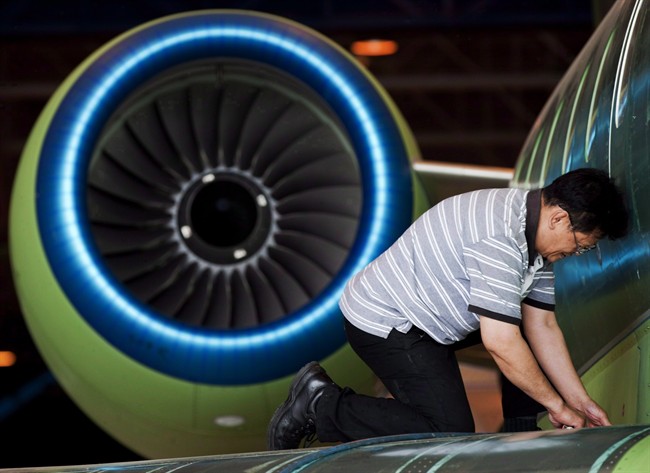MONTREAL – Bombardier is exiting the fractional business aircraft ownership service after 18 years with the planned sale of Flexjet to a U.S. private equity firm for US$185 million.

“The sale of Flexjet’s activities is a unique business opportunity that will allow Bombardier to focus on its core business areas,” said Bombardier CEO Pierre Beaudoin in a statement Thursday.
The Montreal-based aircraft manufacturer said the sale to a group headed by Directional Aviation Capital marks the next step in Flexjet’s evolution as a provider of premium business aircraft for use by companies and wealthy individuals.
In addition to managing business aircraft and offering charter brokerage services, Flexjet allows customers to own a share of an aircraft which gives them a certain number of hours of usage annually or the ability to purchase flight hours.
The new owners have also ordered up to 245 Bombardier aircraft in a deal valued upwards of US$5.2 billion.
The order — the largest in Flexjet’s history — includes a firm order for 85 business jets and 160 options for various Challenger and Learjet aircraft.
The firm order, valued at US$1.8 billion at current list prices, includes 25 Learjet 75, 30 composite Learjet 85, 20 Challenger 350 and 10 Challenger 605 jets. Deliveries will begin in mid-2014 and continue through 2018.
“This order is another very important endorsement for our Learjet and Challenger business jets. We look forward to having our products participate in the growth of Flexjet LLC’s activities and its customer base,” Beaudoin added.

Get weekly money news
Flexjet president Deanna White said the order ensures that the company will remain Bombardier’s largest customer of business jets and the manager of the world’s largest fleet of its business aircraft. However, she said the sale allows Flexjet to eventually add aircraft from other manufacturers.
“We do not have any kind of limitations and in the future, this company will look at different manufacturers but today we’re placing all of our investment with Bombardier,” she said in an interview from the company’s headquarters in Dallas, Texas.
As it pursues international growth, White said Flexjet will consider adding large long-haul aircraft such as Bombardier’s Global 7000 and 8000, but not the CSeries commercial jet that’s set to make its maiden test flight in the coming days.
Flexjet first entered the fractional jet ownership market in a joint venture partnership with American Airlines in 1995. Bombardier became sole owner three years later and has overseen its growth to become the world’s second-largest fractional company after Warren Buffett’s NetJets.
Industry analysts called the divestment and large order positive for Bombardier (TSX:BBD.B).
Walter Spracklin of RBC Capital Markets said Bombardier will receive much-needed cash from Flexjet’s sale and aircraft deposits as the CSeries program is “vulnerable” to cost increases while it progresses towards first flight and entry into service about a year later.
“Accordingly, the positive cash generated from these deals will shore up Bombardier’s balance sheet and help to offset any potential CSeries program cost increases and/or delays,” he wrote in a report.
Cameron Doerksen of National Bank Financial said the order should help boost the production rate of smaller Learjet aircraft which have suffered weak demand since the economic recession.
He said the sale will have a minimal impact on Bombardier’s earnings since he estimated it generated less than two cents per share, but will allow Flexjet to be run by an investment firm focused on private aviation. Among Directional’s other investments is Flight Options, the former fractional operation of Raytheon, which previously owned Hawker-Beechcraft.
“It is our belief that the new owners intend to grow Flexjet more aggressively than what was planned under Bombardier control,” Doerksen wrote in a report, noting that Bombardier delivered only three business jets into Flexjet last year and two in the prior year.
He added that Bombardier won’t suffer a competitive disadvantage from exiting this market since its major business jet competitors don’t or no longer operate such programs.
White said the acquisition of Flexjet gives Directional a premium aircraft offering that will complement its use of Citation, Embraer Phenoms, Hawker-Beechcraft and older planes.
Directional said the addition of Flexjet will offer private air travellers a full range of choices, including fractional ownership, membership, leasing, jet cards and charter. The company will operate 150 aircraft that together will generate more than US$1.1 billion of annual revenues.
Some of Flexjet’s existing 79 aircraft will exit the fleet over time to keep it young, but the order will add planes to accommodate planned growth.
Flexjet is hiring pilots and others for the first time since 2008 after its new business grew by 96 per cent in the first six months of the year.
On the Toronto Stock Exchange, Bombardier’s shares were up 23 cents or nearly five per cent at C$4.95 in Thursday afternoon trading.






Comments